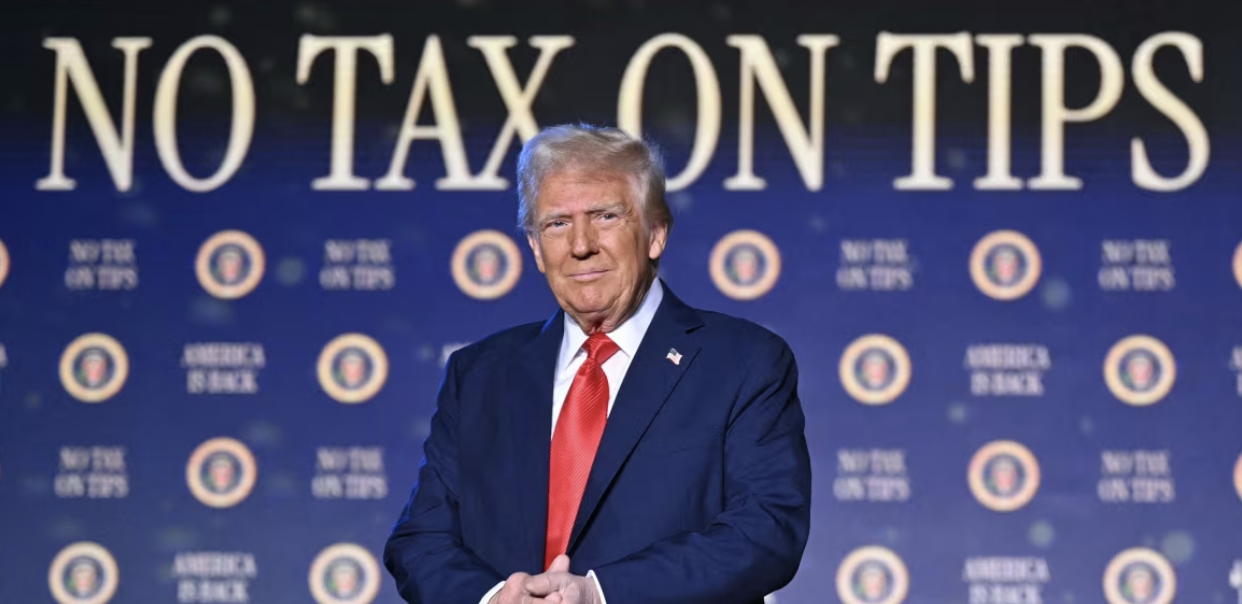Photo via Mandel Ngan/AFP/Getty Images
***
On the 2024 presidential campaign trail, one of President Donald Trump’s central campaign promises was ‘no tax on tips.’ To alleviate the financial burden on low-income employees, he proposed to exempt tips from federal payroll tax while Social Security, Medicare, and other taxes would still apply.
The policy was also picked up by Former Vice-President Kamala Harris’s campaign who added the policy to the campaign platform shortly after Donald Trump’s announcement. Trump accused Harris via Truth Social of copying a policy proposed by him for political gain. This argument was also used by Harris supporters when the promise was first announced at Trump’s Rally. But polls revealed that a ‘no tax on tips’ provision had bipartisan support and some form of it was likely to be passed by either party that won the election.
Trump’s landmark bill, the One, Big, Beautiful Bill Act, included a ‘no tax on tips’ provision that allowed for the deduction of up to $25,000 worth of tips from the federal payroll tax. The deduction decreases by $100 for every $1,000 dollars over $150,000 in income. The tax break is expected to expire in 2028 and will likely be a contested issue in the 2028 presidential election.
The Treasury Department released a list of jobs that will be covered by the new provision, which includes many jobs in the service industry such as waiters, rideshare drivers, and taxi drivers. However, one job not typically defined as service, digital content creator, was also included. Content creators are defined by the Treasury Department as people who “produce and publish on digital platforms original entertainment or personality-driven content, such as live streams, short-form videos, or podcasts.”
In this category there are two main groups of people, influencers and adult entertainment creators, who primarily use platforms like Youtube, Twitch and OnlyFans. Despite the fact income from such sites tends to favor a small number of creators on top and is unevenly distributed among all content creators, removing the tax on tips (not including subscription fees or sponsorship deals) for content creators would increase profits across the board.
This fact, coupled with the growth of OnlyFans and the increased use of other social media platforms such as Twitch and Youtube –spurred on by the Covid-19 Pandemic– means that there is not only an ever-expanding group of content creators but also an expanding market of consumers willing to tip them, expanding the viability of professional content creation. Despite the fact that the majority of money tends to be made by the top 10% of creators, this policy would increase the sustainability of the other 90% of content creators who would not be expected to pay less in taxes. While the exact savings remain to be seen, influencers have been growing in influence (so to speak), being seen as role models and celebrities, and now having representation in congress.
People also receive an increasing amount of their political news from social media, with a growing influence of creators over the elections such as during the 2020 and 2024 election cycles. Social media is becoming one of the central ways Americans, especially young Americans, get political news.
In a press conference, Press Secretary Karoline Levitt stated “We welcome independent journalists, podcasters, social media influencers, and content creators to apply for credentials to cover this White House,” portraying the Trump administration as supportive of independent media. The administration has already threatened press access to mainstream news agencies such as AP News, suggesting a shift to alternate media. It is possible that Trump could leverage this tax provision as a means of appearing more friendly to independent media, especially given previous comments about legacy media claiming that these news sources are ‘fake news.’ There is potential for a further gain for Trump within the influencer sphere which appears to support free speech through independent media. This media is often less thoroughly vetted compared to legacy media, which could increase Trump’s popularity and favorable portrayals at the expense of more thorough journalism.
Despite the possible side effects of the ‘no tax on tips’ provision, it should not be discounted. There is expected to be a decrease of 40 billion dollars from federal revenue on tax collections, according to the Committee for a Responsible Federal Budget. It is worth noting that the majority of tip earners tend to be lower income and skew younger. Although there are potential side effects of such a tax provision, the policy would help people who are struggling with their standard of living, both digital content creators and other workers who earn tips.
Despite potential drawbacks such as increasing consumer expectation to tip, the provision is a major win for content creators who may struggle to make enough income to support themselves. It also incentivizes people to take a shot at being a content creator and further legitimizes the profession. But there is also a noteworthy caveat: the majority of traditional tipped workers also have salaries and the majority of content creators don’t receive such consistent revenues –instead, they receive most of their income through ad revenue, sponsorships, and tips. For content creators, this is an inconsistent form of income, meaning that this tax provision would decrease this uncertainty and increase income stability.
This is a new dawn for content creators in the United States. In summary, a ‘no tax on tips’ provision will likely lead to an increase in take-home pay for lower income employees, especially those who are younger, in addition to stimulating the growth of the adult entertainment sector and prominence of influencers.
***
This article was edited by Anna-Rose Barnes.
